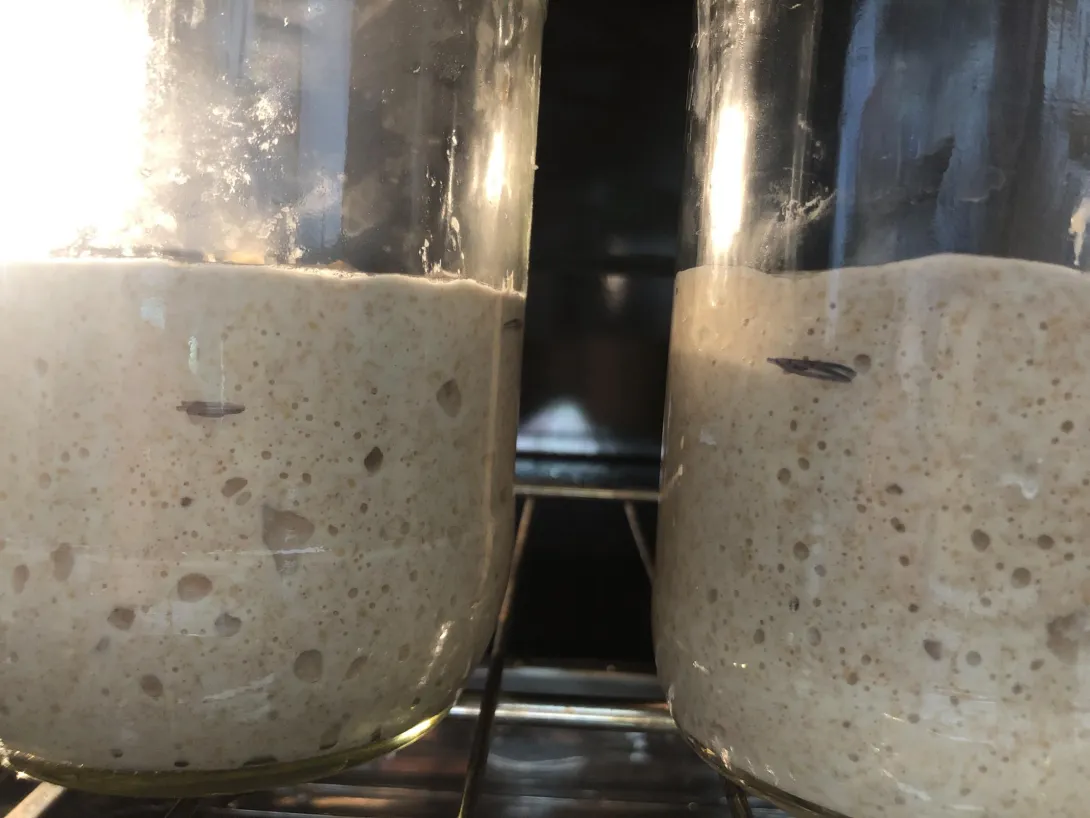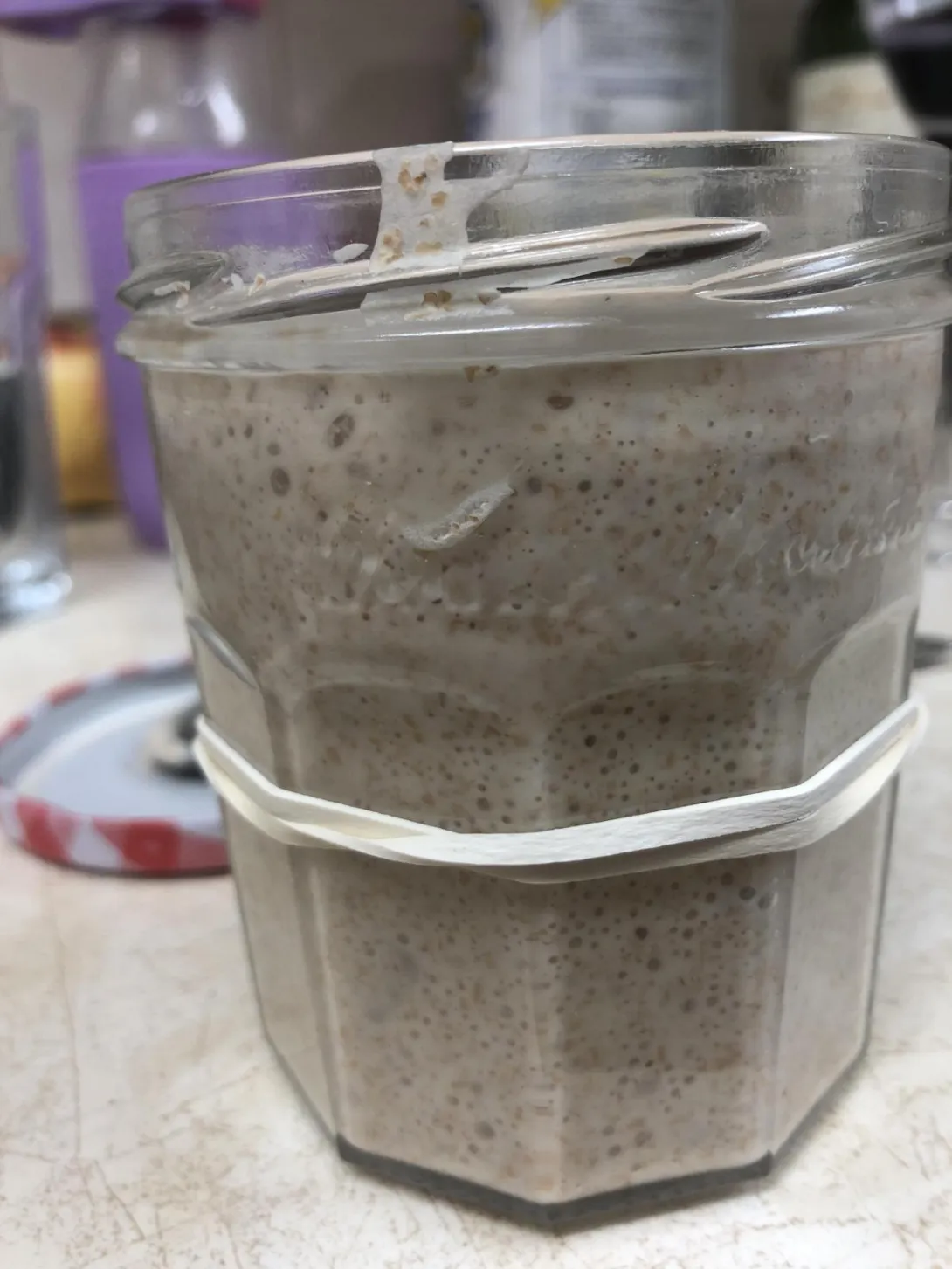
Hello,
It is my first time attempting making a sourdough starter. I have been using half a cup of water (day old tap water) and a cup of whole wheat flour (great plains brand from Costco).
My starter bubbles and rises but except for the second day it never doubled in size. For the past 3 days i have tried feeding it twice and keeping it in the oven with light on as it is cold here in Saskatchewan.
the temperature in the oven is around 30C.
Am i feeding it too often? Did anyone have a similar experience?
I appreciate any guidance.
Is often counterproductive especially when trying to get a starter to rise more if it's struggling. Your starter is young so give it time. Re-feed only when you see it has peaked and just starts to fall. What is the feeding ratio to starter? You said 1/2 cup water + 1 cup flour but not how much starter.
“ Re-feed only when you see it has peaked and just starts to fall”
It is commonly accepted that the starter has fully matured once it reaches peak height and just begins to fall. When the starter matures it means that the yeast microbes have reproduced and multiplied to their maximum numbers.
Here is a hypothetical example for clarification. NOTE - most bakers use weight instead of volume.
Assume the 30g of mature starter has 30 yeast cells. (Not near accurate, but useful for this example) Their are thousands of yeast microbes in a few grams of starter.
You may find something(s) of interest in THIS LINK.
Thank you, probably it is time for me to get a scale. Your explanation sounds reasonable. I will just watch it for now and feed it when it goes down.
Thank you for your reply. I use a half a cup starter
A very comprehensive guide to making a starter. When you've fed your starter a few times, and at the right time, you might wish to switch to healthier feeds but only when you see an improvement. The higher the ratio of fresh flour the more it'll rise.
It is still rising just very slowly.
You don't have to wait for it to go all the way back down. Aim for peaked and just beginning to recede. After all how would you know it's peaked? When it starts getting air bubbles on top that will mean it's peaking and also be a good sign. Aroma too is a good indicator. When first fed it smells of fresh flour and water. As it matures so does the aroma. Get to know your starter. People put all their focus on how much it rises, which is good but only one aspect, get your nose in there. Sometimes you might have to gently, with a spoon, peak beneath the surface to get any smell coming off it.
Now it difficult to stand on top of it catching it at a perfect time. Don't worry about it and just feed as soon as you can once it's peaked. Should you find it's peaking quickly then feed it a higher ratio of flour. Just not too much too soon.
To sum it up it needs time to mature properly. You also need to time the feeds and the ratio according to the rhythm of the starter.
If it's still rising slowly then wait. Eight days in is not that long and if you have been over feeding to get it more active it might have slowed down a bit. No rush. Wait to see what it does and feed when it just starts to recede.
Thank you Abe. Im just feeding them now. Half cup starter half cup water and 1 cup flour. Lets see how they will do in the morning:) i also have to go to walmart to get a measuring device to make sure the proportions are correct.
A stronger, more stable and quicker growth then slowly increase the feed. Just don't go into the next stage till the stage you're on has gone well. For instance the next stage might be 1/4 cup starter + 1/2 cup water + 1 cup flour. As an example.
Just a few bubbles. Haha. Might have killed the beasties
Do not feed it again till you see activity. Till then keep warm and stir every now and again.
since then it has risen about 1cm. I was wondering if at the next feeding i should decrease the quantity and just use 50g starter 50g water and 50g flour now that i got a scale
Before you start feeding again. Perhaps a day or two or even three. Enjoy your time off.
I'm not familiar with cups and measuring ingredients like starter and flour in volume is imprecise however I think you have been close to 1:1:1.
Near enough 1:1:1.
Whenever your starter wakes up again I'd try for 2:2:1 e.g. 80g starter + 40g water + 40g flour. See how it reacts. If it does well then move onto 1:1:1 e.g. 60g starter + 60g water + 60g flour. Again see how it reacts and keep with this feed until it's stable and string then move onto 1:2:2 etc.
It's all about 'feeding to the rhythm of the starter'.
To help your starter along it can always benefit from wholegrain flour especially rye.
For a mature starter, Abe? I've been feeding mine on a 1:2:2 routine (the 1 being the amount of old starter).
a lot depends on how you maintain and use your starter. There is no one correct way other than a healthy feed makes a healthy starter. 1:2:2 is a healthy feed.
That makes sense! Do you have a general set of expectations or rules of thumb you like to use to assess whether a starter is healthy? E.g., total time it takes to double at X room temperature, maybe?
Is getting to know your starter and how it reacts. This only comes through maintaining and using it. Everyone's starter is different.
You can use recipes which give levain builds, temperature and recommended time scales to judge your starter but even then different starters will still differ but it will be a good indicator.
Let's say a percentage of your starter, at a given temperature and timescale performs well then you have a good idea of what to expect. If there is a change for an unexpected reason (a change in temperature would be an expected reason) then you'll know something is off.
You can build up a picture over time.
However if you have a 1:1:1 feed and its struggling to fully mature in 4-6 hours at normal room temperature then that would set off alarm bells.
I find it very helpful to at least have some rough parameters in mind, such as the one you just mentioned regarding a 1:1:1 feed. Thanks!
“ However if you have a 1:1:1 feed and its struggling to fully mature in 4-6 hours at normal room temperature then that would set off alarm bells.”
Temperature should always be considered when dealing with dough fermentation of any kind. Whether talking about a starter, bulk fermentation, or final proof - the temperature is as important as any other aspect. An active starter can triple in 4 hours @ 82F, but that same starter might take 8 hours @ 60F.
Without knowledge of your room temperature we are unable to offer accurate assistance concerning any type of fermentation. Controlling or adapting to the fermentation temperature is one of the most important aspects of bread baking. I consider normal room temp to be 76-78F. Others may think differently.
My room temperature is 73-75F but it only rose 2cm in the past 18hrs after a 1:1:1 feeding
It'll be a while yet
Before you start feeding again. Perhaps a day or two or even three. Enjoy your time off.
I will definitely wait a day or so before feeding it. How often should i stir it?
Only re-feed when you see significant activity. Stir every 12 hours. Once in the morning and again in the evening.
Thank you, will check on it tomorrow how its doing
Got my baby starter going :)
Image

Sorry i meant to reply to this one. The room temperature is around 73-75F.
Thank you Abe, i am using whole wheat flour for now but will order the whole grain rye from Amazon too the one that Dan suggested.
This may be an entertaining rabbit hole for you to pursue while you wait for your starter to mature. It made me laugh, and also helped me stress way less about my starter. Best watched at 1.5X speed (available in You Tube settings). You will get the general gist of things pretty quickly, even if you don't want to watch the whole thing (the summary near the end helps too.) Enjoy!
https://youtu.be/lDjBWNmNBl4
This one is very good ? I am feeling better about my starters. My sourdoughs have names too but in my native language (Hungarian) ?
What formula are you using? I’d like to take a look.
Is the bread gummy?
When you slice it does the knife has some thing gummy on the blade?
I used 450 whole wheat, 300g water 10g salt and 150 g sourdough starter at peak.
Doesn’t look gummy. 71% hydration seems pretty dry for 100% whole wheat. Is it important to you to bake with 100% whole wheat? Are you willing to try some whole wheat and some white flour?
I’m not sure what is going on with your bread.
Thank you Dan, I was thinking of buying some white flour and mix it up a bit. It is just that i got this big 20kg bag of whole wheat flour from Costco hehe. Do you have a good formula for beginners? I am absolutely a beginner. Up until Covid hit i was seldom baking 1-2 times a year, then i first got a bread maker and threw everything in there.
You may find something interesting in THIS LINK and in THIS LINK.
100% whole wheat is very challenging. I recommend reducing the whole wheat to 50% or lower. This will make success much more likely. Once you succeed and gain confidence with that, then incrementally increase the percentage of whole wheat. If you choose to use some portion of white flour, a good quality bread flour (not all purpose) is best.
keep posting your bakes and asking questions. We are here to help...
Krisztina, are you using a bread machine? If so, I have no experience with it. Hopefully those that use one will reply and give you some tips.
Thank you Dan for the links, i will experiment with those. I briefly read the 50-50 whole wheat one and really appreciated the detailed explanation on each element (levain, autolyze, etc).
I do not use the bread-maker any more. The crust is never as crunchy and also can’t play much with the settings. I do like the texture of my current whole wheat sd and it did remain nice and moist inside and crunchy in the outside unlike my first 2 tries. I did extend my autolyse to 5-6 hrs and thats when i got better results.
I do want to learn more and so far have been only getting some really good advice here. Thank you so much for the support on my sourdough baking journey ???
Will keep posting my experimentations.